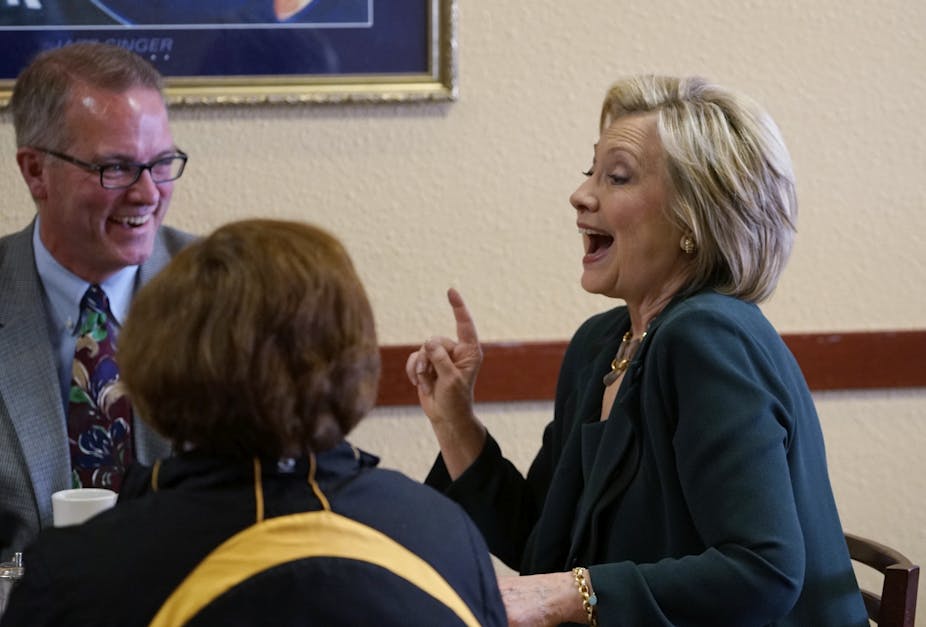Now that Hillary Clinton has announced that she will, indeed, run for the presidency, will her gender matter?
After Barack Obama, one might argue that gender may no longer be an issue. Not only has he broken the barriers for African American men, but his presidency has also made it less remarkable that a woman could become president of the United States.
That said, there is no question that gender is already an issue and may become even more important in Clinton’s campaign.
For example, a group of volunteers supporting Clinton put out a list of 13 words that the media and other candidates should not use when referring to her candidacy. On that list were words such as “calculating,” “insincere,” and “ambitious.”
In response, talk show host Rush Limbaugh gleefully noted that the word “cankles” did not appear on the list so he assumed that he and others can use that word to refer to her. For the uninitiated, Rush defines a “cankle” as an “unusually thick or stout ankle.” The word – from the combination of “calf” and “ankle” – means in this instance that Clinton has heavy lower legs.
It is hard to imagine that a male candidate’s legs would receive the same attention.
But, in general, will gender hurt or help Hillary Clinton?
Perhaps both.
While Barack Obama has to deal with the stereotype of “angry black man,” a label that he negates with his “cool” demeanor, Hillary Clinton must walk a razor-thin line to perform her gender in a way that is acceptable to the American public.
But, what is acceptable to the American public? The answer, as I discovered when I studied the 2008 election, is tricky.
A gendered White House
First, most jobs have genders and the presidency is no exception.
Not only are presidents men, but they are also a certain kind of man. There are many forms of masculinity and presidents represent one type.
Presidents are upper middle class, well-educated, middle-aged, relatively fit, heterosexual, and good-looking men; they are forceful leaders. They are masculine, but not overly aggressive or bullying. Not like Chris Christie, whose image arguably is too earthy and rough, too lower middle-class.
Presidents may be black or white (and perhaps even Latino or Asian in the future), but they are men who conform to our ideal of what male leaders should be: well-dressed and articulate. But not effete!
The president cannot have “feminine” interests. He should drink beer, not wine. Certainly not champagne. He should prefer football or basketball, not sailing. Remember when John Kerry was ridiculed for windsurfing? Conservatives mocked him as too elite, too effeminate, an out-of-touch, Ivy-league educated, rich man who can’t get his hands dirty. Who would want to have a beer with that man?
Given that the presidency is gendered male, what should Hillary do?
2008: the ‘manly’ campaign
One would think that a female candidate should present herself as masculine.
In the 2008 campaign, Hillary emphasized her “manly” characteristics – her experience as a lawyer and senator, her willingness to go to war when necessary, her ability and readiness to make tough choices at 3 AM when the phone rings in the White House.
Clinton contrasted her “manly” traits with the soft qualities she attributed to her opponent. But none of this posturing was successful because America does not like masculine women.
In fact, it was only after Hillary demonstrated her vulnerability by welling up in New Hampshire that she enjoyed more success.
Many empirical studies demonstrate that women in leadership positions are judged more harshly than their male peers. Because the stereotype is that women are followers, not leaders, there is a contradiction between our view of what a woman is and what a leader is.
Women in leadership roles are judged incompetent for job performances that are comparable to those of their male colleagues who are praised for their leadership. But even when a female leader is considered competent, her peers judge her as unlikable.
In essence, female leaders can’t be both competent and likable, but to win an election, they must be both.
This is Hillary Clinton’s dilemma. She must walk a fine line between demonstrating competency and the conclusion that she is a “dragon lady” who suffers from a failed femininity. She must demonstrate feminine characteristics without harming her reputation as an able, intelligent leader.
2015: more comfortable in her gender
Hillary Clinton has struggled with this line since she walked onto the public stage.
She began as the candidate Bill Clinton’s wife who, because of her Yale Law School education and career as a high-powered lawyer, was different from any other President’s wife before her.
At first, she emphasized her independence, stating that she could have stayed home and baked cookies and had teas, but that she had instead followed her career; on another occasion, she asserted that she was not a little woman like Tammy Wynette, standing by her man. All hell broke loose and Hillary had to apologize for both of these comments. She even submitted a cookie recipe to a bake-off competition to show how contrite she was. Hillary was too masculine and independent, and definitely not sufficiently house-broken for the American public.
This week it appears that Hillary Clinton is performing her gender in a more confident way.
Having achieved considerable success as Senator and Secretary of State, she seems to have less to prove. In fact, she is emphasizing that she is a grandmother in an effort to make her and her candidacy more approachable.
We have at least nine months to see if this new “feminine” Hillary Clinton will play well with the public.

